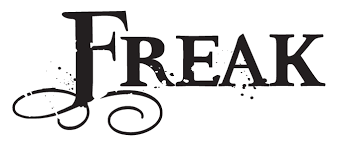记忆方法
将“freak”与“feckless”结合记忆,形成一个场景:一个“feckless”的人做出了一些异常或不寻常的行为,成为了“freak”。这种方法通过将两个词的负面含义连接,帮助你记住“freak”意味着怪异或古怪。
以上内容由AI生成, 仅供参考和借鉴
中文词源
freak 怪人
词源不详。
英语词源
- freak (n.1)
- 1560s, "sudden and apparently causeless turn of mind," of unknown origin. Perhaps it is from a dialectal survival of a word related to Middle English friken "to move nimbly or briskly," from Old English frician "to dance" [OED, Barnhart]. There is a freking attested in mid-15c., apparently meaning "capricious behavior, whims." Or perhaps from Middle English frek "eager, zealous, bold, brave, fierce" (see freak (n.2)).
Sense of "capricious notion" (1560s) and "unusual thing, fancy" (1784) preceded that of "abnormally developed individual or production" (first in freak of nature, 1839, which was later popular in variety show advertisements for bearded ladies, albinos, etc.; compare Latin lusus naturæ, which was used in English from 1660s). As "drug user," attested from 1945. The sense in health freak, ecology freak, etc. is attested from 1908 (originally Kodak freak, a camera buff). Freak show attested from 1887. - freak (v.)
- "change, distort," 1911, from freak (n.1). Earlier, "to streak or fleck randomly" (1630s). Related: Freaked; freaking.
- freak (n.2)
- "brave man, warrior," Scottish freik, from Middle English freke "a bold man, a warrior, a man," from Old English freca "bold man, a warrior," from frec "greedy, eager, bold" (compare German frech "bold, impudent").
权威例句
- 1. Weir broke his leg in a freak accident playing golf.
- 韦尔因为一次打高尔夫时发生的离奇事故折断了腿。
- 2. A freak wave had buckled the deck.
- 突然掀起的巨浪打弯了甲板。
- 3. By some freak of fate, she won an enormous sum of money.
- 她不知交了什么好运, 赢了一大笔钱.
- 4. It was a freak of mine to wear pink pajamas.
- 穿上粉红色睡衣是我一时的奇想.
- 5. A freak wave washed the two children away.
- 突如其来的浪头把两个孩子卷走了.
